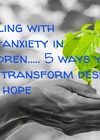Dealing with eco-anxiety in children – 5 ways you can transform despair into hope
It was Earth Week recently and being the Principal of an education centre, I’m pretty familiar with the activities that go on to draw children’s attention to the plight of the planet. But something felt different this year. Reading things online and chatting to parents in the community, I’ve become aware that there’s a growing anxiety in children of all ages, particularly from the tween years and upwards, regarding the climate crisis. So it seems important to discuss the effect that this eco-anxiety is having on children’s mental health.
You could probably say that every week is Earth Week now, such is the onslaught of messages in the media updating us on the fate of the world due to our lack of cohesive action. I’m not saying these messages shouldn’t be out there. Quite the opposite (and we should be practicing ongoing change in our daily lives, not just one week a year). But is it causing a secondary problem by exposing children to this barrage of existential news?
According to many studies and reports, mental health issues in children are on the rise, and some of it can be traced back to the pressure that children are feeling knowing that the planet is in trouble and that seemingly, not a lot is being done about it by the very people they’re supposed to trust: adults. As a result, children are feeling the weight of change is upon them why simultaneously feeling powerless to do anything about it.
The potential incapacity of people in power, and grown ups in general, to solve the problem of climate change is also forcing children to get to grips with adult concepts at an earlier age. Geo-politics is something that most of us were probably oblivious to until we were teenagers at least. The idea that it’s possible for politicians to fail to lead, scientists not believed, and people who willingly spread lies must be a shocking and difficult thing to process when you’re not even able to vote. No wonder it’s now possible for children to be plunged into the depths of despair so young.
It seems, if we’re to accept that this is actually a thing now – children suffering from eco-anxiety - then solving climate change and environmental-related stress are inextricably linked. The more we actively work towards finding solutions, the better children will be able to cope with the realities of the world we’re leaving them.
These are some things we can do to reshape despair into hope:
Empower children with their own agency
Gently guide your child to understand that they have the capacity to take initiative within them. When you’re young (or even when you’re old sometimes!) it can feel like there’s someone else calling the shots and that you have to wait for permission to do things. That’s true to a degree, but building resolve in children will prepare them for the idea that they are yet another person in charge on the planet, not just a follower.
Change doesn’t have to be big
Get children acquainted with the idea that every person, no matter how small, can shift things by the decisions they make every day. While the change might seem insignificant on it’s own, the key is consistency, not size. Over time, sticking with their decisions leads to change, and it also has the ripple effect of inspiring others to do the same.
Manage their exposure to news
You need to decide the level of media consumption that you think is appropriate for your child. Perhaps it means overseeing research on school projects, changing the radio station, talking to their teacher or switching the TV off if you think they’re overwhelmed. Try to stay informed yourself so you can share information in a way that you think they can process.
Explore and research together
A good way to both validate their feelings of concern, make fears more manageable, and empower them, is to spend time together learning about what’s going on. You don’t need to be an expert. In fact, treating it like a joint undertaking plays into the positive nature of curiosity and limits the notion that some children have that adults are holding back all this scary information which they’re going to rain down on them at some point. Research can take you to exploring some of the positive initiatives that are being adopted around the world.
Set family goals
Instil the idea that change is something that happens locally, not somewhere else more important. By deciding on some actions that the family can undertake together you might be able to assuage some of the helplessness that your child could be feeling. Being able to see a measurable difference is empowering and can be achieved through things like waste reduction, donating funds to a cause, altering your diet to include more meatless options, refilling recycled bottles and jars instead of purchasing products with single use plastic, or planting a vegetable garden. If you want to go one step further, you can measure some of these things on a chart to make it visual and tangible.
Let me know what ideas you have that we can share.

